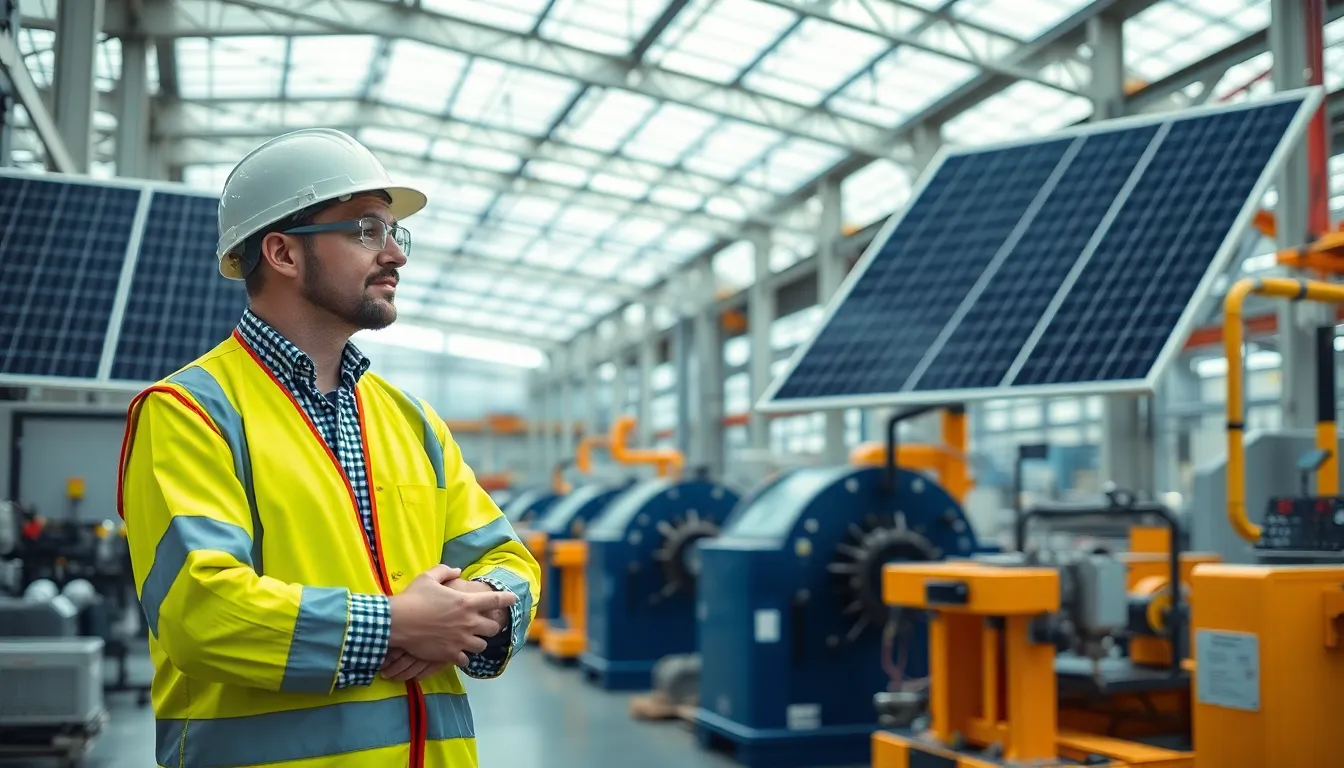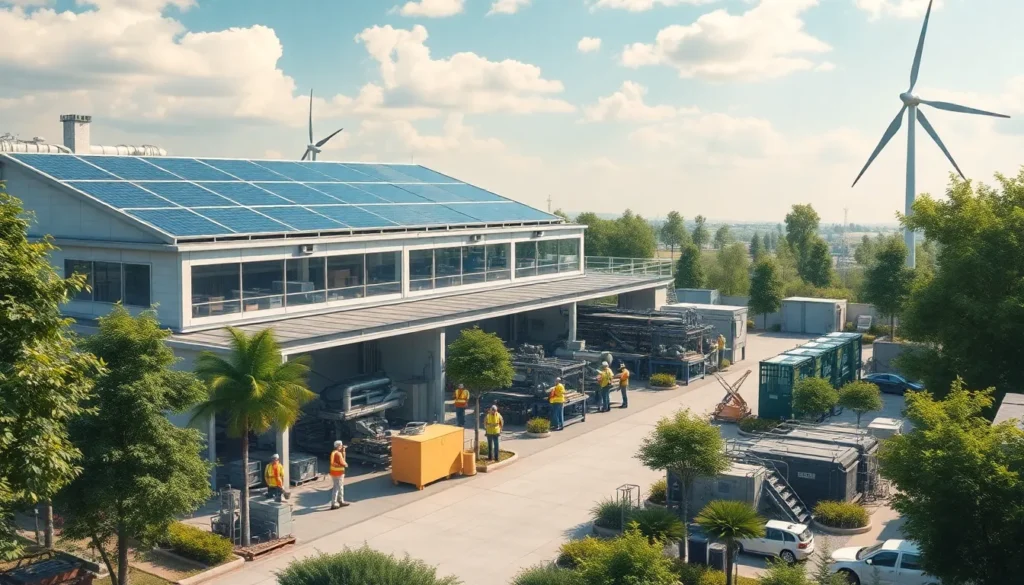Table of Contents
ToggleIn a world where eco-friendly is the new black, sustainable manufacturing technology is stepping into the spotlight like a rock star at a sold-out concert. Gone are the days of polluting factories and wasteful practices; now, it’s all about making products without leaving a trail of destruction in their wake. Imagine a factory that not only produces goods but also hugs trees—yes, it’s possible!
Overview of Sustainable Manufacturing Technology
Sustainable manufacturing technology integrates eco-friendly practices into production processes. This innovative approach reduces environmental impact while enhancing efficiency. Companies leverage renewable energy sources, such as solar and wind, to power their operations. Energy-efficient machinery improves resource utilization.
Waste reduction strategies play a critical role in this technology. Techniques such as recycling, reusing materials, and reducing excess help minimize waste output. Implementing closed-loop systems further supports sustainability, maintaining resource use within the manufacturing cycle.
Sustainable materials, such as bio-based plastics and recycled metals, contribute to environmentally friendly production. Innovations in material science help create products with less ecological footprint, paving the way for greener supply chains.
Digital technologies facilitate the transition to sustainable manufacturing. Smart sensors and IoT devices optimize processes, providing real-time data to enhance efficiency. Automation lowers energy consumption while improving productivity, creating less waste in the overall system.
Investing in research and development drives advancements in sustainable solutions. Companies committed to sustainability often realize significant cost savings in the long term. Industry standards and regulations encourage the adoption of sustainable practices, aligning business goals with environmental stewardship.
Through eco-innovation, manufacturers transform challenges into opportunities. By adopting sustainable manufacturing technology, they demonstrate a commitment to environmental responsibility, ultimately contributing to a healthier planet.
Key Principles of Sustainable Manufacturing

Sustainable manufacturing relies on several key principles, fostering environmental responsibility within production processes.
Resource Efficiency
Resource efficiency maximizes the use of inputs in manufacturing. Minimizing energy consumption contributes significantly to reducing overall operational costs. Companies adopting energy-efficient technologies see a marked decrease in their carbon footprints. Utilizing renewable energy sources, like solar and wind, enhances operational sustainability. Adaptations in machinery design further improve energy management. Efficient water usage and recycling advance resource conservation efforts. Sustainable logics aim for reduced depletion of natural resources while maintaining production levels.
Waste Reduction
Waste reduction strategies play a pivotal role in sustainable manufacturing. Implementing recycling programs helps companies minimize material waste across the supply chain. Closed-loop systems that reuse materials decrease dependence on virgin resources, promoting a circular economy. Continuous improvement initiatives drive waste identification and elimination throughout production. Utilizing eco-design principles ensures products are easier to recycle or repurpose. When manufacturers focus on waste reduction, they often enhance their market competitiveness while promoting environmental stewardship.
Innovations in Sustainable Manufacturing Technology
Sustainable manufacturing technology evolves rapidly, showcasing innovative solutions to reduce ecological impact. Among these advancements, renewable energy integration stands out.
Renewable Energy Integration
Renewable energy sources play a crucial role in reducing manufacturing’s carbon footprint. Companies now harness solar and wind energy to power their operations, minimizing reliance on fossil fuels. Energy-efficient machinery complements these efforts by utilizing resources more effectively. Additionally, some organizations invest in energy storage systems to optimize energy use during peak demand. This shift not only reduces operating costs but also aligns with industry goals for sustainability.
Advanced Materials
Advanced materials are revolutionizing sustainable manufacturing practices. Bio-based plastics and recycled metals have emerged as viable replacements for traditional materials, decreasing environmental impact. Innovations in material science are enabling products with improved performance and lower ecological footprints. Specifically, lightweight composites enhance energy efficiency during transportation, contributing to reduced emissions. Manufacturers that embrace these materials can enhance their sustainability profiles while meeting consumer demand for eco-friendly products.
Challenges in Implementing Sustainable Manufacturing
Sustainable manufacturing faces various challenges that hinder its widespread adoption. Understanding these obstacles helps businesses navigate their path toward eco-friendly practices.
Economic Barriers
Economic factors pose significant challenges to sustainable manufacturing. High initial investment costs may deter many companies from embracing new technologies. Smaller businesses, in particular, struggle to allocate funds toward sustainable practices. Additionally, fluctuations in raw material prices can impact the viability of eco-friendly options. Maintaining competitive pricing becomes difficult when the costs associated with renewable resources and advanced technologies rise. Moreover, short-term financial pressures often lead firms to prioritize immediate profits over long-term sustainability goals. Each of these economic barriers highlights the need for strategic planning and incentives to boost adoption.
Technological Limitations
Technological limitations present prominent hurdles in sustainable manufacturing. Many manufacturers lack access to cutting-edge technologies that drive efficiency and reduce waste. Traditional machinery may not support advanced sustainable practices, necessitating expensive upgrades. Inadequate infrastructure also impacts the integration of renewable energy sources into existing systems. Furthermore, the rapid pace of technological advancement leaves some companies behind, unable to keep up with innovations that enhance sustainability. Training employees in new technologies adds another layer of complexity, requiring additional time and resources. Overcoming these technological limitations becomes essential for truly realizing the benefits of sustainable manufacturing.
Future Trends in Sustainable Manufacturing Technology
Numerous developments signal the future of sustainable manufacturing technology. Increasing reliance on automation enhances productivity while minimizing energy usage. Solar and wind energy integration continues to play a vital role in reducing the carbon footprint of production operations.
New advancements in energy storage technologies are emerging, allowing for improved utilization of renewable energy sources. This shift further supports the consistent energy supply needed for manufacturing processes. Smart manufacturing, which utilizes IoT devices, enables companies to monitor and optimize resource use in real-time.
Bio-based plastics are gaining popularity as sustainable alternatives to traditional materials. Softening regulations on environmental practices encourage companies to innovate and adapt. A circular economy model focuses on reuse and recycling, ensuring that materials are not discarded at the end of their life cycle.
Education and training programs are becoming essential for equipping the workforce with necessary skills. Manufacturers benefit from integrating these programs to facilitate smoother transitions to sustainable practices. Networking collaborations among industries foster knowledge-sharing, thus speeding up the adoption of innovative technologies.
Data-driven decision-making alongside effective resource management is crucial for advancing sustainability. Companies committed to eco-friendly processes often experience increased market competitiveness and customer loyalty. Stakeholder engagement in sustainability initiatives further enhances corporate social responsibility and aligns with consumer preferences.
These trends indicate a strong shift toward a future where sustainable manufacturing practices are not just adaptable but essential to maintaining competitiveness in the global market. As companies prioritize environmental strategies, the potential for innovation within sustainable manufacturing technology expands significantly, shaping a new era of responsible production and consumption.
Sustainable manufacturing technology is not just a trend but a vital evolution in the industry. By embracing eco-friendly practices manufacturers can significantly reduce their environmental impact while enhancing efficiency. The integration of renewable energy and innovative materials is paving the way for a greener future.
As companies face challenges in adopting these technologies they also uncover opportunities for growth and competitive advantage. With ongoing advancements and a commitment to sustainability organizations can transform their operations to meet both consumer demands and environmental responsibilities. The path ahead is clear: prioritizing sustainability is essential for long-term success and a healthier planet.







